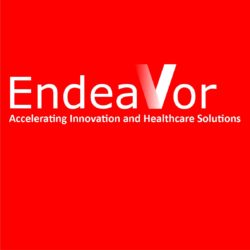ENDEAVOR LIFE SCIENCE VENTURE STUDIO
Endeavor has created an ecosystem that creates sustainable resilient CEO/Entrepreneurs and funding for development, growth, commercialization and scalability from Seed Stage to Series B. Endeavor has designed a funnel within our ecosystem that moves our companies from the Venture Studio, to Venture Fund, and ultimately moves our companies into Corporate Accelerators and Corporate Venture who collectively have dedicated several billion dollars to advance the companies with a clear entry and exit path of increasing investment and integration into their corporate ecosystem leading to eventual acquisition.
In the last two decades, three types of organizations — incubators, accelerators, and venture studios — have emerged to reduce the risk of early-stage startup failure by helping teams find product/market fit and raise initial capital. Most are founded and run by experienced entrepreneurs that have previously built companies and who understand the difference between theory and practice.
Accelerators like Y-Combinator, Techstars, and 500 Startups offer a cohort of startups a six- to 12-week bootcamp. But these look for founders who have a technical or business model insight and a team. Accelerators provide these teams with technical and business expertise and connect them to a network of other founders and advisors. The culmination of this bootcamp is a “demo day” where all startups in the cohort have a few minutes to pitch their companies to venture capitalists and angel investors. (In some cases the accelerator provides initial funding themselves.) In exchange for attending an accelerator, startups give up 5% to 10% of their company’s equity.
There are thousands of accelerators across the globe. The business model for most is to select startups that can generate venture-class returns — i.e., grow into companies that can potentially be worth billions of dollars. For most accelerators, admission is by application and interview. Some, like Y-Combinator, Techstars, and 500 Startups, are open to all types of startups in any market, while others, like SOSV, IndieBio, HAX, Orbit, and dLab are more specialized.
Incubators are similar to accelerators in that they provide space and shared resources to startups, but usually no or very small amounts of capital. Their financial models are based on membership fees that grant access to a shared co-working space, resources, and access to other founders and operational expertise.
The Alternative: Endeavor Life Sciences Venture Studio
Unlike an accelerator, a venture studio doesn’t fund existing startups. Instead it provides very “hands on” guidance and operational and strategic guidance with seasoned entrepreneurs, subject matter experts and business leaders to help grow, scale and commercialize the company’s products or services.
Venture studios create startups by incubating their own ideas or ideas from their partners. The studio’s internal team builds the minimum viable product, then validates the idea by finding product/market fit and early customers. If the idea passes a series of “Go/No Go” decisions based on milestones for customer discovery and validation, the studio recruits entrepreneurial founders to run and scale those startups. Examples of companies that have emerged from venture studios include Overture, Twilio, Bitly, Aircall, and the most famous alum, Moderna.
With more than 625% growth in the studio market over the last seven years venture studios have a shot at remaking the entrepreneurial ecosystem as we know it.
See more HBR charts in Data & Visuals
Most venture studios create and launch several startups each year. These have a greater success rate than those that come out of accelerators or traditional venture-funded companies. That’s because unlike accelerators, which operate on a six- to 12-week cadence, studios don’t have a set timeframe. Instead, they search and pivot until product/market fit is found. Unlike an accelerator or a VC firm, a venture studio kills most of their ideas that can’t find traction and won’t launch a startup if they can’t find evidence that it can be a scalable and profitable company.
See more HBR charts in Data & Visuals
There are four main types of venture studios:
Tech transfer studios, such as America’s Frontier Fund, work with companies and/or government labs to source ideas and intellectual property. They then transfer the IP and build the startup inside the venture studio.
Corporate studios, such as Applied Materials, source ideas and intellectual property inside their own company. They then build the startup inside a separate corporate venture studio inside the company.
A niche studio is a standalone venture studio that generates its own ideas and IP in a specific industry and domain — for example, Flagship Pioneering, which is focused on health care and incubated LS18, the company that became Moderna.
An industry-agnostic studio, such as Rocket Internet, is a standalone venture studio that generates its own ideas and IP and is industry and market agnostic.
Today there are around 720+ venture studios across the world — half are in Europe. In both North America and Europe, many venture studios in non-major cities are funded by government agencies to stimulate local growth, at times with matching donations from companies. These studios have different metrics than startup studios whose limited partners are private family offices or venture capitalists.
Why Would an Entrepreneur Join a Venture Studio?
In contrast with an accelerator that takes 5% of a startup’s equity, venture studios take anywhere from 30%. This is because companies exiting a venture studio have been handed a startup that has de-risked of much of the early-stage startup process.
Why would an entrepreneur join a venture studio and give up the majority of their company rather than go to an accelerator? Most accelerators tend to look for a “founder type” — a stereotypical techie, fresh out of college, who already has an idea and cofounders.
Most people don’t fit that pattern. And even if they do, they are not fully equipped to take a company to success.
90% of startups fail in the first 3 years. Not because they run out of money as most CEOs believe, but because they don’t know how to put the right team, partnerships, and strategies together and don’t have the team to implement revenue accelerating go-to-market strategies (which are often flawed).
They lack key partnership and collaborators, and are often fearful of sharing their ideas because they believe their product is so unique and so valuable that everyone wants to steal it.
This is just poor judgment and leads to a death spiral of isolation, going it on your own, and ultimately then running out of money and failing. It’s the lack of leadership and vision that leads to running out of money. Not as most CEOs believe, running out of money as the great driver of failure.
Endeavor Venture Studio addresses these problems with proven solutions for success. Once you know how to be successful, you can template it. And that’s what separates Endeavor Venture Fund. We have over 25 years of experience in building and exiting great healthcare and life science businesses, all supported by our ecosystem of Big Tech, Big Pharma, MedTech, Biotech, HealthTech, and Prominent Academic Institutions like Harvard, MIT, Boston University, McGill University, NYU, and Columbia University. We partner with the largest Fortune 500 Companies and greatest institutions to help provide a problem solved ecosystem at the hands of great CEO/Entrepreneurs who are committed to growing, commercializing and scaling the next great healthcare and life science Unicorns.
A study of 23 leading venture studios found that of the 415 companies they created, only 9% have failed.
Endeavor II Venture Fund and Venture Studio were launched in June of 2022 targeting an investment into 100 – 200 innovative new Seed and Series A Life Science companies over the next three years. Advances in science, medicine and technology have converged in an unprecedented way creating a sea change of advancements for patients.
Exciting new companies that are developing gene therapies to create personalized medical treatments that can last ten years, wearable sensor companies that empower patients with realtime personal health data, advances in drug discovery with 3-D printing of tissues and organs, quantum computing companies accelerating the pre-clinical drug discovery process to deliver new drugs years faster to patients, new diagnostic companies that utilize nanotechnology to allow almost instant identification of bacterial, viral, and fungal infections, and AI companies creating more efficient and effective diagnostic algorithms, treatment algorithms and surgical plans are the early leaders in a wave of healthcare innovation that will reshape our global healthcare system for decades.
Endeavor II believes that the social impact from these advances in delivering drugs, devices, and services to patients is remarkable. And the Gershon family is dedicated to playing an important role in improving the healthcare system, decreasing patient morbidity and mortality and shifting the mindset from disease focused healthcare to preventative care, building an ecosystem of health and wellness.
Supporting this process means not only direct investment of financial capital, but also intellectual and human capital. And this we will do through our Mentorship and Venture Studio Program, providing vital information for early stage life science, healthcare, and health and wellness companies that is specific to this sector of entrepreneurship such as FDA regulatory affairs, clinical trial design, intellectual property and trade secrets, licensing and royalty arrangements, and important strategic and corporate partnerships.
It is our strong belief that it is never too early to play the Long Game. The team at Endeavor II is focused on building strong, resilient, sustainable companies that grow faster and with greater consistency than the historical norms. We believe that strategic and operational planning coupled with strong partners and solid corporate structure and governance should be established early as these elements are vital for success as companies look for financing in Angel Investors, Venture Investors, Family Funds, and Strategic and Corporate Investors, all having different vernacular and mandates.
We consider it a privilege to work with exciting leading entrepreneurs, scientists and inventors to build innovative life science, healthcare and health and wellness companies for the betterment of healthcare for everyone. This process is grounded in a social mandate and supported by the belief that great new companies will garner strong support from the investor communities as healthcare leads as a dominant growth sector over the next several years delivering what we believe to be likely outsized returns to investors.
.
.

